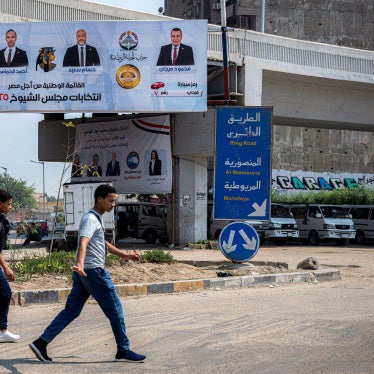In a letter dated May 15, 1997, Human Rights Watch and the Committee for International Academic Freedom, a group of prominent U.S. scholars and academic leaders, call on the Egyptian government to release Cairo University professor Ahmed al-Ahwany. Dr. al-Ahwany has been held in a Cairo prison without a hearing since April 24, 1997, when he was arrested for photocopying a paper critical of a controversial provision of an Egyptian agrarian reform law. Human Rights Watch and the Committee also express their concern that al-Ahwany's detention will have a "deleterious and chilling effect on the exercise by other citizens of their fundamental right to seek information and to freedom of expression."
A copy of the letter follows.
May 15, 1997
His Excellency Hosni Mubarak
President of the Arab Republic of Egypt
c/o His Excellency Ahmed Maher El Sayed
Embassy of the Arab Republic of Egypt
3521 International Court, N.W.
Washington, D.C. 20008
Your Excellency: We write on behalf of Human Rights Watch and the Committee for International Academic Freedom to express our grave concern over the recent arrest and continued detention, now entering its fourth week, of Cairo University professor Ahmed al-Ahwany.
Dr. al-Ahwany, assistant professor of chemical engineering at the Faculty of Engineering, Cairo University and a prominent and active member of Cairo University Staff Members Club, the Egyptian Engineers Syndicate, and various Egyptian human rights organizations, was arrested by State Security Investigation ("SSI") on April 24, 1997. Dr. al-Ahwany was arrested when he arrived at a bookstore/photocopying center, located off Giza Square close to Cairo University, to pick up a photocopy order he had placed earlier that day. The documents he wished to have copied included a paper criticizing a provision of a controversial Egyptian agrarian law, due to take affect in October of this year, which allows landowners to remove long-term tenant farmers from the land.
For possessing and attempting to make copies of this paper, Dr. al-Ahwany has been accused by the State Security Prosecutor's Office with having violated article 102 bis of the Egyptian penal code, a law which prohibits the dissemination of "false or biased news, statements or rumors" and the distribution of "inciteful propaganda" with intent to endanger public security or public welfare. Among the lines of questioning put to Dr. al-Ahwany by prosecutors after his arrest was a series of inquiries concerning his opinions about the agrarian law and about the critical stance toward the law adopted in the paper in his possession.
Dr. al-Ahwany currently is being held in Mazra'at Tora prison in Cairo under provisions of Egyptian penal law which allow the State Security Prosecutor's Office to have a suspect held in preventive detention for up to 45 days before review by a magistrate. Dr. al-Ahwany originally was held under a 15-daydetention order which was renewed on May 6 for another 15 days by deputy State Security Prosecutor Walid el-Guindy. Dr. al-Ahwany's case has not yet been brought before a magistrate. Dr. al-Ahwany's detention constitutes a clearviolation of Article 19 of the International Covenant on Civil and Political Rights ("ICCPR"), ratified by Egypt on January 14, 1982, which guarantees all individuals the freedom to seek, receive and impart information and ideas of all kinds. This fundamental guarantee is directly contravened where, as here, an individual is imprisoned merely for having in his possession and making copies of a paper critical of government policy. Although Article 19 of the ICCPR allows for certain restrictions on freedom of information on grounds of national security, the terms of any such restriction must be specific and narrowly tailored to prevent against arbitrariness and to ensure that the internationally recognized human rights of all individuals are protected. The detention of Dr. al-Ahwany and the threat of further penal sanctions against him under the vague provisions of Article 102 bis of the Egyptian penal code constitute precisely such an arbitrary restriction on Dr. al-Ahwany's rights under Article 19 of the ICCPR. The questions put to Dr. al-Ahwany after his arrest concerning his views on the agrarian law, moreover, suggest an intent to harass and intimidate him for the opinions he holds, an action which violates the absolute guarantee of freedom of opinion enshrined in the first sentence of Article 19 of the ICCPR.
Finally, we believe that, even if the prosecution decides not to pursue the case against Dr. al-Ahwany or if the matter eventually is dismissed by a magistrate, his detention for up to 45 days will have a deleterious and chilling effect on the exercise by other citizens of their fundamental right to seek information and to freedom of expression. The Committee on International Academic Freedom is particularly concerned with the adverse consequences for academic freedom and scholarship. A university cannot fulfill its paramount role in fostering free inquiry, rational discourse and open exchange of ideas where professors must live in fear that they will be imprisoned on grounds such as those under which Dr. al-Ahwany currently is being held.
We urge the government of Egypt to desist from applying its laws to imprison persons for the possession and reproduction of written materials and, in the absence of evidence establishing that Dr. al-Ahwany actually was involved in inciting violence, we call on the government to release Dr. al-Ahwany immediately and unconditionally.
Thank you for your consideration of this important matter. We look forward to your reply.
Sincerely,
Jonathan Fanton Co-Chair, Committee for International Academic Freedom
Eric Goldstein Acting Executive Director, Human Rights Watch/Middle East
cc: His Excellency Farouq Sayf al-Nasr, Minister of Justice Mr. Walid el-Guindy, State Security Prosecutor's Office
His Excellency Dr. Hussein Kamel Baha'eddin, Minister of Education Chancellor Dr. Mufid Shehab, Cairo University
Ms. Naela Gabr, Human Rights Department, Ministry of Foreign Affairs
His Excellency Muhammad C. Chabane, Permanent Representative of Egypt to the European Union
His Excellency Mohamed Shaker, Ambassador, London, England
U.S. Assistant Secretary of State John Shattuck, Bureau of Human Rights and Humanitarian Afffairs
The Honorable Edward Walker, Jr., U.S. Ambassador, Cairo, Egypt








